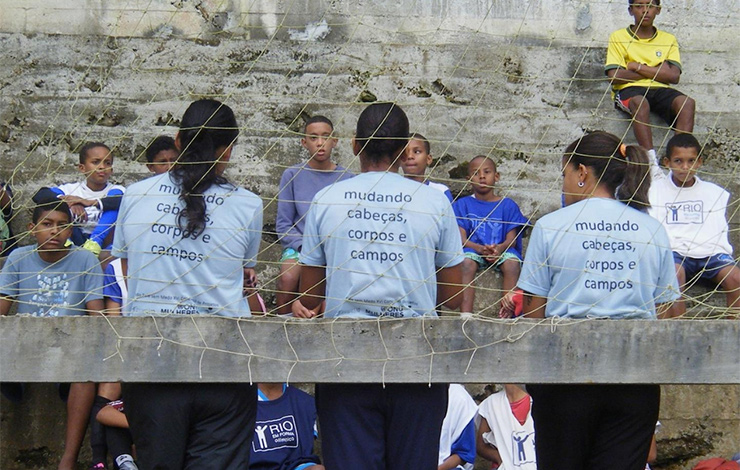Through the Ganhando Terreno World Cup 2014 Campaign, the Guerreiras Project raised awareness about women’s empowerment, employability, and gender justice at the FIFA Men’s World Cup 2014. The program trained female futebol players as Guerreiras Ambassadors. In turn, the Guerreiras Ambassadors led workshops for other female players on essential employability skills.
Challenge

Despite futebol being Brazil's most popular sport, female futebol players have long been confronted with significant gender prejudice and are invisible within mainstream Brazilian culture. They constantly have to fight for space and recognition within a male-dominated world and a historically male profession. To account for their struggle, female players refer to themselves as guerrerias (‘female warriors’).
Since female players in Brazil are undervalued, under-respected, under-supported, exploited and disempowered in their profession, their rights as women and workers are often ignored. Very few of the players sign contracts, receive the minimum wage, get worker's benefits and many confront a myriad of worker's rights issues including exploited informal labor, lack of protections, job insecurity and sexual harassment. They've expressed the feeling of being lucky just to have a team to play on, and therefore the harassment, below-minimum wage salaries, late pay checks, lack of health care coverage and medical treatment, lack of proper equipment, lack of field space, lack of proper food and nutrition remain unspoken and accepted.
These informal and unstable precarious work conditions not only affect the players during their employment, but they also hinder their job prospects after their futebol careers are over. Because they often have no formal contracts while playing, female players often have no proof of their income for the majority of their careers. This limits their possibilities in the formal labor market post-futebol, and makes something as simple as opening up a bank account nearly impossible.
Program Summary
The Guerreiras Project (GP), an international gender justice initiative, launched the Ganhando Terreno World Cup 2014 Campaign to promote women’s empowerment, employability and gender justice through futebol in Brazil. The Men’s FIFA World Cup 2014 in Brazil presented a rare and precious opportunity to raise awareness around the issues of gender justice, employability and women’s rights. The GP believed that the platform of sport was a compelling and effective tool to carry out this work during a historic moment in time when the sport and the nation became the center of the world’s attention––‘um palco para jogar, um campo para mudra,’ (a stage to play, a field for change), as the Guerreiras say. The project included three parts:
- Part I- Building the capacity of female players: GP trained some of the most inspirational, motivated and strong, yet largely invisible, women in Brazil – female futebol players – to take their leadership skills from futebol to advocating for women’s rights and worker's rights. Twenty-four female futebol leaders from across Brazil received this training and learned about work standards, entering and exiting contractual agreements, minimum wage standards, worker benefits, and protection from discrimination. The training certified the participants as Guerreiras Ambassadors, who are now qualified to apply and teach this material in workshops with their local community and peers. In addition, each Guerreiras Ambassador was connected to a Gurreiras Mentor, a professional business woman at the end of the training.
- Part II- Ambassadors led Futebol Feminino Workshops: Trained ambassadors led Futebol Feminino Workshops with women’s professional, semi-professional and amateur futebol teams on women’s rights, gender justice and employability issues. Workshops targeted female players’ aged 18-35 years old in Sao Paulo and Porto Alegre, Brazil. Participants were connected to the Guerreiras Employability Rede and gained access to mentors and resources for learning to negotiate contracts, write CV’s, interview for a job, and were also connected to internship opportunities.
- Part III- Voices of participants recorded and amplified: Ambassadors recorded the voices of participants as they reflected on the dialogue over the course of the workshops and their voices will be registered at the Centro da Memória do Esporte (CEME) at the Federal University in Rio Grande do Sul (UFRGS). CEME's introduction of innovative technological interventions and a multimedia platform amplified these voices so that they had the potential to reach and impact thousands of female players and their communities across the country.
Impact
Each Guerreiras Ambassador carried out workshops in their local area with local women’s futebol teams. Each workshop required two ambassadors and was three hours in duration. These ambassadors directly impacted around 600 females between the ages of 12-35 over the course of the year (30 players/team x 20 teams = 600 players).
At the individual level, the program empowered female players. The female participants enhanced their voice, skills, knowledge and understanding of how to access their rights as workers and women. They learned about their fundamental rights, legal contracts, employability laws, and how the informal and formal labor market affect women's futebol. They also learned how to find their voice through their individual and collective stories of prejudice and empowerment from the game, and how they can turn these stories into tools for change. They discussed the ways in which their experiences from the field in leadership, communication, goal-setting, teamwork, accountability, trust, and cross-cultural understanding are all skills that can be applied off the field to the workplace and empower them in their lives beyond futebol.
At the societal level, the program addressed deep-rooted assumptions, biases and harmful stereotypes about women's roles and capabilities. Female players' presence in this male profession can challenge norms and traditionally narrow scripts of femininity and masculinity. These women are at forefront of a struggle. Beyond the individual skills that these women gain, they can serve as powerful role models and pioneers of women’s rights in society. Their presence in a historically male arena can deconstruct paradigms, promote justice and challenge the cultural stigma that has long limited women in society. This project gave them the tools to speak up, be heard and be seen.
Partners
- 'Center on the Memory of Sport' (CEME), The Universidade Federal do Rio Grande do Sul
- Themis
- Women Win


